
As the CEO of Functional Devices, Inc., a leading U.S.-based manufacturer of building automation controls like relays, current sensors, power supplies, lighting controls, and more, I'm frequently asked about the differences between products labeled "Assembled in America" versus those that can proudly claim to be "Made in America." While both designations indicate some level of American production or labor is involved, there are crucial distinctions with major implications for quality, continuity, sustainability, and strengthening domestic manufacturing capabilities.
When a product carries an "Assembled in America" label, it means the final assembly occurred in the United States, but one or more key components, raw materials, or inputs originated from other countries. The assembly process does create some American jobs, which is certainly positive. However, a significant portion of the value-added economic impact and supply chain still exists overseas. Products marked "Assembled in America" only represent partial domestic manufacturing.
In contrast, products with an authentic "Made in America" designation have a deeper and truly comprehensive domestic manufacturing footprint. Producing substantial transformers from individual components to final assembly happens within the United States, leveraging American workers, American factories, and American quality standards at every stage of production.
The Critical Advantages of "Made in America"
As both a buyer and manufacturer of industrial products and components for over 50 years, Functional Devices firmly believes the "Made in America" label carries substantial advantages over just "Assembled in America." Here are some of the paramount benefits:
1.
Uncompromising Quality Control
When a product's manufacturing process occurs within our borders, it becomes far easier for a company to control and ensure quality at each step through uniform standards and clear accountability. With sub-assemblies coming in from disparate overseas sources, as is common with many "Assembled in America" products, quality control inevitably becomes more fragmented, opaque, and difficult to enforce consistently.
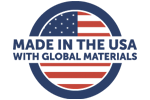
At Functional Devices, we obsess over quality - it's a core part of our brand promise and value proposition. So much so that we test 100% of every product before it leaves the manufacturing floor. We simply cannot rely on fragmented supply chains and unknown quality practices in other countries. That is why many of our products carry the "Made in the USA with Global Materials" label. We meticulously manage and validate quality from raw materials and components to the out-the-door finished product.
2.
Supply Chain Speed, Agility, and Resilience
The COVID-19 pandemic vividly highlighted how globally distributed supply chains packed with overseas dependencies are incredibly vulnerable to disruptions like port closures, shipping delays, factory shutdowns, and shortages of key components or raw materials. With a manufacturing process in the United States, "Made in America" products have a shorter, more localized, more agile, and more reliable supply chain.
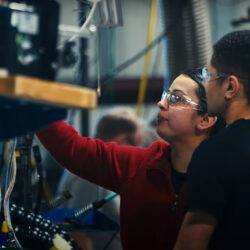
With a majority of our products being manufactured here in America, we can rapidly adapt to changing situations, and get our building controls products to customers faster with far less risk of delays, quality issues, stockouts, or costly bottlenecks. Extensive reliance on international suppliers and transport lines is a massive liability in our modern world of unpredictable systemic shocks. That said, supply chain constraints eventually impact everyone in every industry, and how we navigate these challenges can limit their negative effects and maintain product availability for customers. Throughout 2021 and a significant portion of 2022, Functional Devices experienced lead time challenges, primarily with our PSH300A and PSH500A series products. These delays were caused by supply constraints from a domestic vendor who could not meet the demand. While acknowledging these shortcomings, Functional Devices has since resolved the issue and is now celebrating a return to excellent service and lead times. It's worth noting that several other companies within the industry are still grappling with similar challenges. Moving forward, Functional Devices aims to shift the focus solely toward quality, highlighting its commitment to delivering superior products and services to its customers.
3.
Stringent Regulatory Compliance
Many industries that Functional Devices serveâ- including building controls, automation systems, energy products, and infrastructureâ- have stringent regulatory requirements around product safety, hazardous materials traceability, environmental compliance, and more. With many suppliers and final manufacturing based solely in the U.S., it becomes exponentially easier for manufacturers to consistently adhere to critical regulations like OSHA worker safety rules, RoHS hazardous substance restrictions, UL safety certifications, and other standards.
When components and materials come from all over the world, verifying compliance with America's regulatory regime becomes an extremely daunting challenge. Can you really be certain about the workplace standards, environmental practices, and materials traceability behind products from an overseas factory you've never visited or audited? With "Made in America" you can.
4.
Developing Skilled American Workforce Capabilities
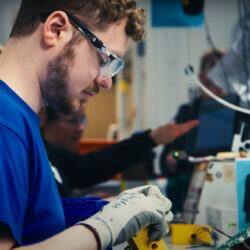
While it's true that certain types of industrial and manufacturing skills have declined in America as companies chased lower costs by shifting production overseas, companies like Functional Devices are committed to reversing that trend. We regularly invest in training a new generation of skilled industrial, technical, and manufacturing talent locally through tuition reimbursement opportunities, internships, job rotation programs within our factory, competitive compensation packages, and more.
Every single "Made in America" product supports the development of a capable, highly skilled domestic workforce with technical capabilities that are critical to America's long-term economic growth and competitiveness as an innovation leader. We're proud to be doing our part to rebuild the nation's industrial base and create pathways to skilled, good-paying jobs in our communities.
5.
Environmental Sustainability Leadership
The environmental impact and carbon footprint of a product encompasses much more than just the final assembly stage. It includes the full sourcing, processing, and production lifecycle of raw materials and components that get rolled up into that product over time. American factories in industries like ours tend to have more stringent emissions, waste disposal, energy efficiency, and sustainability requirements than manufacturing plants in many other countries.
"Made in America" products can have a meaningfully smaller environmental toll and give companies a way to verifiably prove their green credentials to both regulators and customers who increasingly demand sustainable products and practices. For a growing business like ours with a large industrial/commercial customer base, that's an important competitive advantage.
6.
Maximizing America's Economic Might
Perhaps the most obvious yet powerful advantage, products truly "Made in America" create new jobs, drive economic growth, increase tax revenues, and strengthen manufacturing and innovation capabilities - keeping all those benefits within the United States economy rather than leaking out overseas.
More income circulates locally, creating positive ripple effects throughout the nation's cities, communities, and labor force. "Made in America" production enhances America's economic might, industrial base, and strategic positioning as a global superpower with robust domestic manufacturing capabilities across multiple sectors.
By contrast, products merely "Assembled in America" with heavy foreign sourcing of components and sub-assemblies only capture a small slice of that economic value creation within our borders. The substantial remainder flows to other countries rather than benefitting American workers and communities.
The Potential Downsides of "Made in America"
In the interest of a fair and balanced perspective, I do want to acknowledge some of the potential challenges or downsides that American manufacturers must confront and overcome when migrating to a "Made in America" model:
1.
Higher Initial Costs
It's a straightforward economic reality that without access to lower-cost labor markets and more relaxed environmental or workplace regulation standards in some developing nations, domestic U.S. manufacturers can face higher input costs leading to higher pricing versus imports or competitors who continue relying heavily on overseas sources for components and raw materials.
However, I firmly believe that while "Made in America" products may carry a higher initial sticker price, the quality, continuity, and longer-term economic benefits make that cost differential well worth paying for industries that provide critical national infrastructure, security, and core industrial capabilities. There's a reason the old saying "buy cheap, buy twice" exists.
2.
Skill and Capacity Restraints
With the decades-long migration of manufacturing prowess and abilities to overseas markets, America's industrial skills base and production capacities have been steadily eroded in many sectors where factories once thrived and production was fully on-shored. This harsh reality makes rapidly ramping up domestic manufacturing extremely challenging in industries that have become overly reliant on outsourcing and offshoring over time.
Rebuilding those atrophied skills and bringing production capabilities back stateside won't happen overnight. But with proper investment, worker training programs, financial incentives to reshore operations, and laser-focused commitment by companies with vision, those core manufacturing and industrial technology capabilities can be restored over a reasonable timeframe. At Functional Devices, we're playing a leadership role in this revitalization effort within our industry.
Truly Unleashing the Advantages of "Made in America"
Overall, while the "Assembled in America" designation represents a step up from pure offshoring with zero domestic economic impact, the reality is that at Functional Devices, we are fully committed believers that "Made in America" is the ideal that more American manufacturers should be striving towardsâ- especially in sectors like building automation controls, infrastructure, and technologies that underpin national security and supply chain resilience.
Domestically produced products made by American workers in American factories simply represent a superior long-term model for quality control, supply chain continuity, regulatory compliance, environmental sustainability, workforce development, and maximizing our nation's economic power.
To be clear, not every product in our portfolio has a domestic production footprint, and we absolutely must remain globally competitive by wisely utilizing advantageous supplier relationships around the world where it makes sense. However, we are continually executing against a long-term roadmap and making strategic investments to deepen our American supply chains and re-shore key manufacturing processes over time wherever feasible.
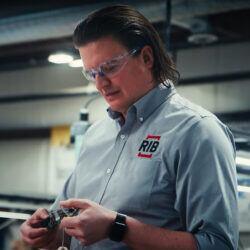
Most of our relays, current sensors, and a growing number of our product lines are already "Made in the USA with Global Materials." Wherever we've been able to achieve this localized production model, we recognize meaningful competitive advantages in quality, continuity, and customer service delivery. After all, "committed to quality" is one of our core values, and we strive for our products to have zero failures in the field. Not just for our customers, but for our customers' customers: the teachers and students in schools, the doctors, nurses, and patients in hospitals, and so many more.
About Functional Devices, Inc.
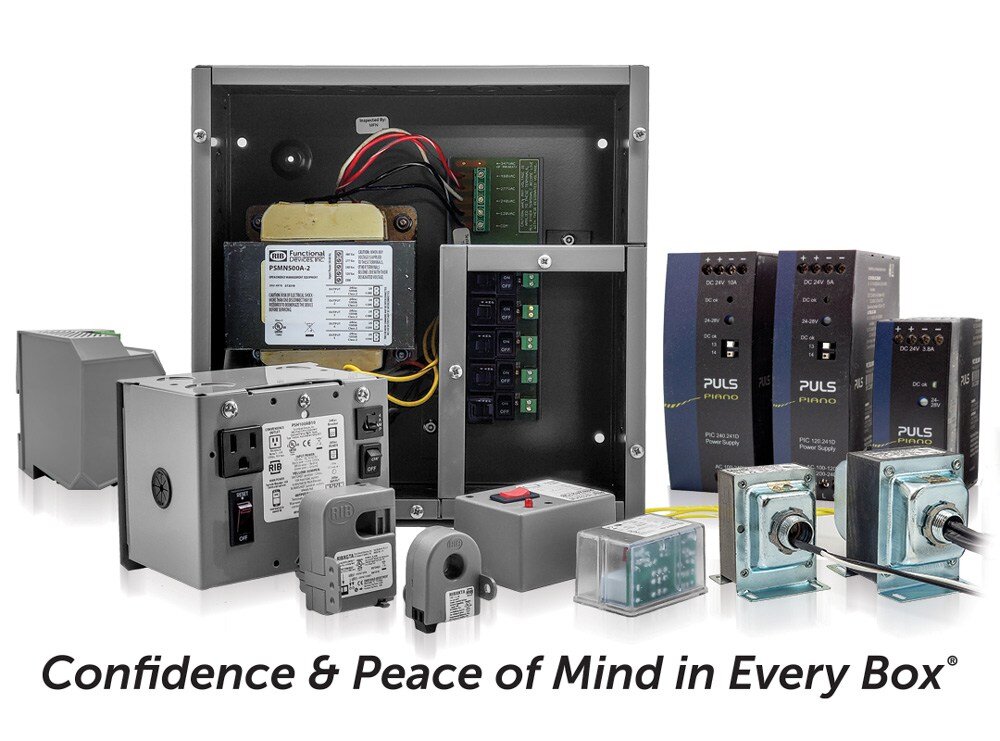
Functional Devices, Inc., located in the United States of America, has been designing and manufacturing quality electronic devices since 1969. Our mission is to enhance lives in buildings and beyond. We do so by designing and manufacturing reliable, high-quality products for the building automation industry. Our suite of product offerings include RIB relays, current sensors, power controls, power supplies, transformers, lighting controls, and more.
We test 100% of our products, which leads to less than 1 out of every 16,000 products experiencing a failure in the field.
Simply put, we provide users of our various product confidence and peace of mind in every box.